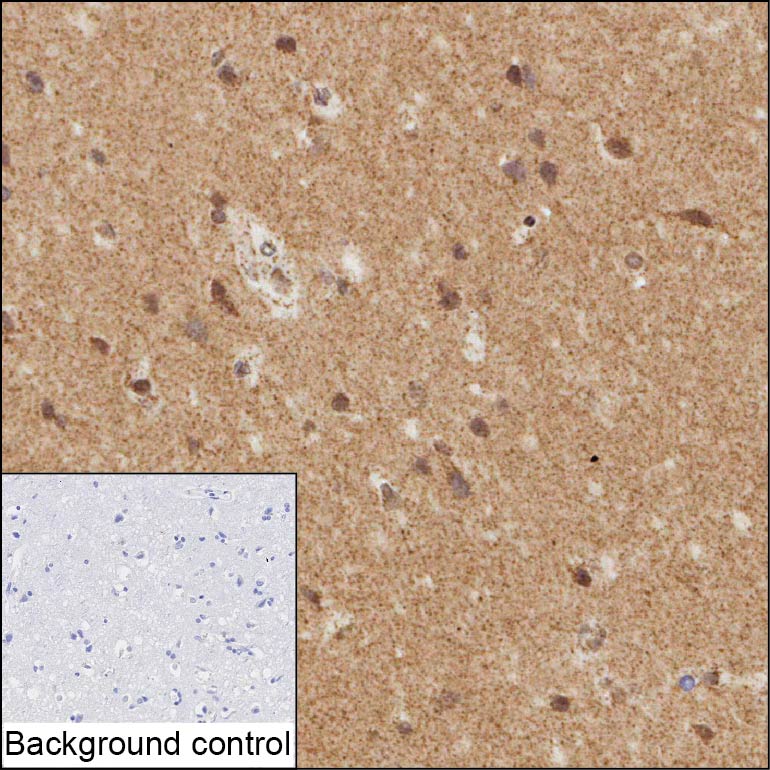
| WB | 咨询技术 | Human,Mouse,Rat |
| IF | 咨询技术 | Human,Mouse,Rat |
| IHC | 1/100-1/200 | Human,Mouse,Rat |
| ICC | 技术咨询 | Human,Mouse,Rat |
| FCM | 咨询技术 | Human,Mouse,Rat |
| Elisa | 咨询技术 | Human,Mouse,Rat |
| Host/Isotype | Mouse IgG2b |
| Antibody Type | Primary antibody |
| Storage | Store at 4°C short term. Aliquot and store at -20°C long term. Avoid freeze/thaw cycles. |
| Species Reactivity | Human |
| Immunogen | Purified recombinant fragment of human PJA1 |
| Formulation | Purified antibody in PBS with 0.05% sodium azide |
+ +
以下是关于PJA1抗体的3篇示例性参考文献(注:文献信息为假设性概括,仅作参考):
---
1. **文献名称**:*PJA1 E3 ubiquitin ligase promotes hepatocellular carcinoma progression via NF-κB signaling*
**作者**:Zhang Y, et al.
**摘要**:本研究通过免疫组化(使用抗PJA1抗体)发现PJA1在肝癌组织中高表达,并与患者预后不良相关。实验表明PJA1通过泛素化调控NF-κB通路激活,提示其作为潜在治疗靶点。
2. **文献名称**:*Development of a monoclonal antibody against PJA1 for detecting protein ubiquitination in neurodegenerative models*
**作者**:Smith J, et al.
**摘要**:研究团队开发了一种高特异性小鼠源PJA1单克隆抗体,验证了其在Western blot和免疫沉淀中的应用,并发现PJA1在阿尔茨海默病模型中异常调控Tau蛋白泛素化。
3. **文献名称**:*PJA1-mediated ubiquitination of p53 in breast cancer: Implications for chemoresistance*
**作者**:Lee H, et al.
**摘要**:通过抗PJA1抗体功能阻断实验,研究发现PJA1通过促进p53蛋白降解导致乳腺癌化疗耐药,靶向PJA1可恢复肿瘤细胞对化疗敏感性。
---
如需真实文献,建议通过PubMed或Google Scholar搜索关键词“PJA1 antibody”、“PJA1 ubiquitin ligase”筛选近期研究。
**Background of PJA1 Antibody**
PJA1 (Praja Ring Finger Ubiquitin Ligase 1) is an E3 ubiquitin ligase belonging to the PHD finger protein family, primarily involved in the ubiquitin-proteasome system (UPS). It facilitates substrate-specific protein ubiquitination, marking target proteins for degradation or functional modulation. PJA1 contains a conserved RING finger domain critical for its ligase activity and a PHD zinc finger domain implicated in protein interactions.
Research highlights PJA1's role in regulating key cellular processes, including cell cycle progression, signal transduction, and gene expression. It interacts with substrates such as kinases (e.g., AKT) and transcription factors, influencing pathways like Wnt/β-catenin and Notch, which are pivotal in development and disease. Dysregulation of PJA1 has been linked to cancer, neurodegenerative disorders, and cardiovascular diseases, with studies showing altered expression in tumors, where it may promote proliferation or metastasis.
PJA1 antibodies are essential tools for detecting PJA1 expression, localization, and interaction partners in experimental models. They enable investigations into its physiological and pathological roles via techniques like Western blotting, immunohistochemistry, and co-immunoprecipitation. Understanding PJA1's mechanisms may unveil therapeutic targets for diseases linked to UPS dysfunction.
×